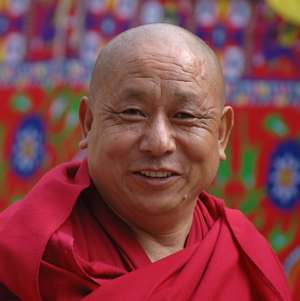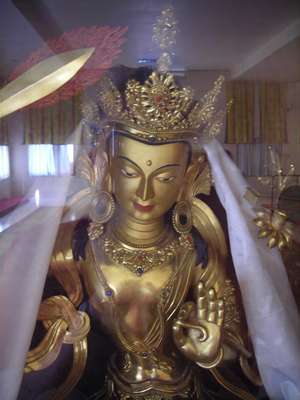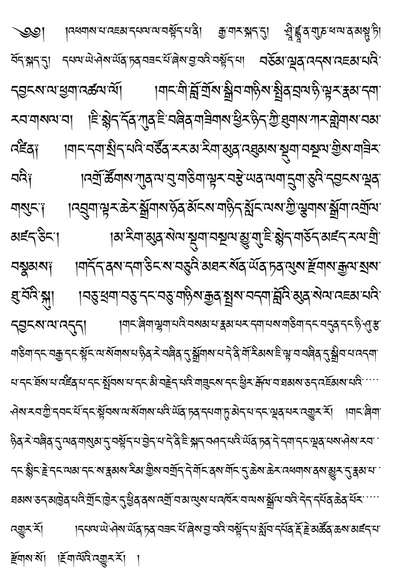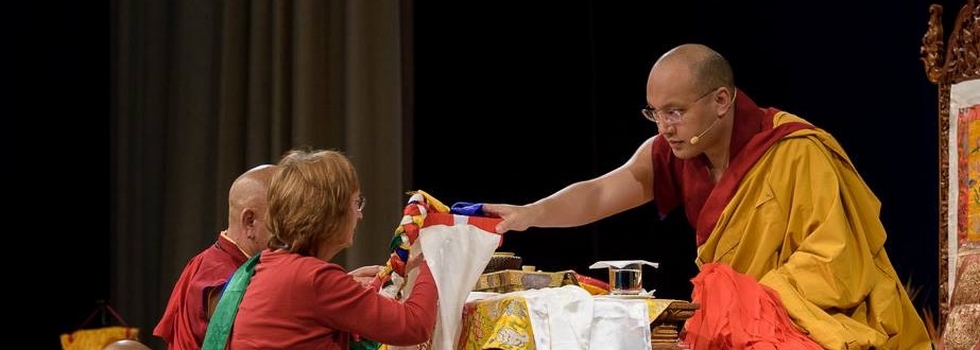Bodhisattva Manjushri

Venerable Chöje Lama Phuntsok
Teachings presented during our Manjushri Retreat
at Karma Chang Chub Choephel Ling, Heidelberg, in October 2009.
"Until I awaken, I take refuge in
The Buddha, the Dharma, and the Supreme Assembly.
Through the goodness of generosity and other virtues
May I awaken fully in order to help all beings."

"Namo Guru Manjushri Ye"
Introduction
It was many a year ago that 500 of the greatest scholars gathered at the renowned University of Nalanda in India with the intention of composing a song in praise of the goodliness of Bodhisattva Manjushri. Every scholar composed a prayer of praise. When they compared what they had written independent of each other, all 500 compositions were exactly alike, and this is The Praise to Glorious Manjushri as we know it today. It is the most precious devotional prayer to the Lord of Pristine Wisdom, Noble Manjushri, therefore reciting it is very beneficial and meaningful.
It can be quite tiring for young monks, nuns, and students to read and recite the many long texts that are a part of their daily curriculum and practice, but if they go outside their study hall or room, circumambulate the Stupa, and recite this prayer 100 times, they can return to their studies and obligations completely refreshed. The Praise to Glorious Manjushri is extraordinary and the blessing that a dedicated disciple receives by reciting it is immense. Because it was composed by 500 of the greatest scholars, it is very profound and cannot be understood or explained easily. It is therefore necessary to explain it word for word. Before doing so, though, I want to give you the oral reading transmission.
Praising the Good Qualities of Glorious Manjushri's Timeless Wisdom
The first line of Praising Glorious Manjushri is:
"/ Gang-gi-blo-grös-sgrib-gnyis-sprin-bräl
nyi-ltar-rnam-dag-rab-gsäl-bäs /
His intellect, free of the clouds of the two obscurations,
shines just as immaculately as the sun."
The first Tibetan word in the first line of the praise, gang-gi, means 'his' and refers to Manjushri. We address him when we speak this. bLo-grös, the second word in this line, means 'great wisdom-awareness' (shes-rab-chen-po) and refers to Manjushri's great intelligence. What is the reason he has great intelligence, i.e., great wisdom-awareness? Because he is free of the two obscurations, sgrib-gnyis, which are the coarse obscurations of disturbing emotions (nyön-mongs-pa'i-sgrib-pa) and the subtle cognitive obscurations of knowledge (shes-bya'i-sgrib-pa). The two obscurations are compared with clouds. As long as clouds cover the sky, the sun's rays cannot shine forth and warm the Earth. When the clouds have dispersed, sprin-bräl, the sun is not impeded and shines freely and brightly. Then the dark gloom of obscurations has no chance, so the next line speaks of the result. It is:
"/ Ji-snyed-dön-kun-ji-bshin-gzig-phyir
nyid-kyi-thugs-dkar-glegs-bam-'dzin /
Since (he) sees all things as they really are,
(he) holds a volume of sacred scriptures at the center of his heart."
The ability to clearly see all things as they really are refers to the two kinds of pristine wisdom (ye-shes-gnyis), the wisdom of realizing how all things are (chös-nyid-ye-shes) and the wisdom of realizing how all things appear (ji-ltar-ye-shes). Chös-nyid means 'the very nature of things' (dharmata in Sanskrit), so chös-nyid-ye-shes is knowing precisely all details of every single phenomenon, e.g., knowing why something is red and not yellow. Ji-ltar-ye-shes means knowing the mode of being (gnäs-lugs) of all outer and inner phenomena, inner phenomena referring to the mind. Having overcome the two obscurations, Manjushri has great wisdom-awareness (shes-rab-chen-po) and, having realized pristine wisdom, he has vast, all-knowing, primordial wisdom (ye-shes-kyi-mkhyen-rgya-che-ba). To signify that he has perfected and thus embodies timeless wisdom, we are told that with his left hand he holds a sacred text at his heart. On the statue depicted in this article and on paintings, he holds the stem of the flower that blooms above his left shoulder, the volume of sacred scriptures lying above the center of the flower. Both depictions have the same meaning, namely that in his heart he is all-knowing, has complete and perfect love and compassion, and has immense power and strength. The Tibetan term kun-mkhyen-pa ('all-knowing, omniscient') is all-encompassing knowledge of every field of study, both worldly and other-worldly, i.e., transcendent.
The next two lines in The Praise that we then recite are:
"/ Gang-dag-srid-pa'i-btson-rar-ma-rig-mün-'thoms-sdug-bsngäl-gyis-gser-ba'i
'gro-tsogs-kun-la-bu-gcig-ltar-brtse-yan-lag-drug-cu'i-dbyangs-ldän-gsungs /
Plagued by afflictive confusion (caused by the) darkness of ignorance, very many living beings are in the prison of conditioned existence.
(He) loves all living beings like an only child and (thus) has the 60 qualities of melodious speech."
Conditioned existence is srid-pa in Tibetan and is synonymous with the Sanskrit term samsara ('the state of continually taking birth under the control of our afflictive defilements'). Due to their darkness of ignorance, living beings are caught in the prison of samsara and are therefore subject to unremitting suffering and pain. Just as a father loves his only child, Manjushri has love and compassion for everyone. Due to his great loving compassion, he has 60 skilful qualities of speech that help us become free of the ignorance that keeps us fettered in samsara. We looked at the qualities of his mind, the two wisdoms of knowing how things are and how they appear, but the time at our disposal is too short to speak about the 60 wonderful qualities of Manjushri's speech. One quality of his speech is that his voice is very pleasant to hear and brings much joy to everyone who hears him. Due to his immeasurable love and compassion, he always speaks softly to help living beings become free of samsara.
The next two lines in The Praise that we recite are:
"/ 'brug-ltar-cher-sgrogs-nyön-mongs-gnyid-slongs-läs-kyi-lcags-sgrog-'gröl-mdzäd-cing
ma-rig-mün-sel-sdug-bsngäl-myu-gu-ji-snyed-gcöd-mdzäd-räl-gri-bsnams /
The thunderous roar (of his voice) wakes (us) up from the sleep (of our) afflictive emotions (and his speech) frees (us) from the chains of (our) karma.
With a sword (in his right hand, he) dissevers the dark gloom of ignorance (and thus) cuts away (our) many seeds of suffering."
By comparing his voice with the roar of thunder, these lines describe Manjushri's power and strength. Our darkness of ignorance and our afflictive emotions are likened to sleep. When thunder suddenly roars overhead, anyone who is asleep immediately wakes up. In the same way, Manjushri's voice wakes us up. Just as thunder wakes us up from sleep and mental stupor, his mighty wisdom wakes us up from the dark gloom of ignorance and powerfully breaks the chains of our karma. The second line above tells us that with his sword Manjushri dissevers our confusion and cuts away our karma before it ripens and sprouts. The sword that he holds in his right hand symbolizes that he cuts away ignorance and therefore all suffering.
When we recite the prayer to Glorious Manjushri, we praise the three qualities that he perfected. They are: the qualities of his mind by having perfected the two kinds of wisdom, the 60 qualities of his speech, and the qualities of his mighty strength. We needn't have the meaning of every single word in The Praise in mind when we recite it. It is good to remember the general meaning and to recite it with sincere faith and devotion. When we recite the lines, we should be aware of the Manjushri's immense qualities.
Then we pray:
"/ gdöd-näs-dag-cin-sa-bcu'i-mthar-son-yön-tän-lüs-rdzogs-rgyäl-sräs-thu-bo'i-sku
bcu-phrag-bcu-dang-bcu-gnyis-rgyan-spräs-bdag-blo'i-mün-sel-'jam-dpäl-dbyangs-la-'düd //
Primordially pure, (you) have reached the 10th Bodhisattva bhumi and have perfected all qualities.
Noble Son of the Victorious One, 10 times 10 plus 12 ornaments adorn your body. I bow to Manjushri and ask (you) to please dispel the darkness from my mind."
The first of these two lines addresses the qualities of Manjushri's body. Being free of the two obscurations of mind, in the core of his being he is a fully enlightened Buddha and has all qualities that are attained by having reached a Bodhisattva's 10th level of realization. Being the Son of the Victorious One, the Buddha, Manjushri manifests in a human form for the benefit of all living beings. He has the 32 distinctive and 80 secondary physical marks of a Buddha, i.e., 112 in all. The 32 qualities are that of the Dharmakaya and the 80 secondary qualities are those of the two form kayas ('bodies of a Buddha'). By reciting the second part of the last line above, we ask him to dispel our mind's darkness.
And so, there are 8 lines in The Praise to Manjushri. The first two describe the qualities of his mind, the third and fourth his great love and compassion, the fifth and sixth his power and strength, and the seventh and eighth praise his manifest appearance. We are able to develop great faith, confidence, and devotion in Manjushri by sincerely reciting this prayer of praise.
It is impossible to develop devotion without having confidence, so we need to see a reason to do so. In order to have confidence in Manjushri, we need to be aware of his qualities and trust that we, too, can attain them. But we need to know his qualities well. In order to have confidence and devotion for him, we need to know that he possesses all qualities of wisdom, of love and compassion, of strength, and that he has all physical marks of enlightenment. We can gain certainty of his qualities and can then easily develop sincere devotion. It will be hard gaining certainty of his qualities without having stable and firm devotion, though. While unstable and insecure, we will sometimes have devotion and sometimes we won't. Thinking of a small child, the child won't lose trust in its mother just because she becomes angry on and off. Why does a child trust its mother fully? Because it is certain that the mother has all qualities and will give protection. We should develop the same kind of strong trust and confidence in a deity of meditation and in our Lama.
When we recite the prayer of praise, we know that we are addressing Manjushri's great qualities and thus develop and increase our faith and confidence in him by calling them to mind. We have confidence in his great wisdom when we recite the first two lines, confidence in his great love and compassion when we recite the next two lines, confidence in his great power to free us from ignorance when we recite the next two lines, and we remember that he possesses all physical marks of an Enlightened One, a Buddha, when we recite the last two lines of the prayer. If we recite the prayer of praise with upright confidence in his qualities of realization, then we will receive his blessing. So, this concludes the discussion of the prayer, Praising the Good Qualities of Glorious Manjushri's Timeless Wisdom.
Gaining Certainty
Somebody might tell us that someone having such great qualities as Manjushri can't really exist, causing us to doubt. It is only possible to gain certainty in someone's qualities by focusing our attention on coming to know what is true. For example, we trust the bank where we deposit our savings and are confident that our money won't be stolen or lost. Of course, nowadays it's another matter, but if we are sure of a bank, then we bring our money there and feel that our hard-earned savings are safe. In the same way, it is utterly necessary to gain certainty of Manjushri's great qualities that are addressed in The Praise and not to have slightest doubts. Otherwise we doubt and are uncertain whether there is such a meaningful deity worthy of praise or not.
About 100 years ago there was a Tibetan Khenpo who at the age of 20 still couldn't read. He wondered, "I haven't managed to learn to read up to now. What will become of me?" He went to live in a cave and said to himself that he would not leave until Manjushri appeared to him, face to face. He had a small statue of Manjushri, placed it on his little shrine, focused his attention one-pointedly on the statue, recalled all his great qualities of wisdom, loving compassion, and power, while he continuously called Manjushri in fervent prayer. Due to these best conditions of rten-´brel ('interdependence'), light emitted from the little statue and dissolved into Khenpo, uniting him with Manjushri and thus bestowing upon him unfailing, timeless wisdom. Khenpo had truly received the blessing of Bodhisattva Manjushri. He then left his cave and was able to fluently read and understand all 13 volumes of the sacred scriptures that are studied in the great monastic universities. Khenpo lived during the times of Jamgon Kongtrul Lodrö Thaye, who is known as Düs-gsum-mkhyen-pa, the 'One Who Knows the Three Times.'
We may think that stories like this are strange, but they happen. For instance, we see our face when we look in the mirror, don't we? If the mirror is polished, we see the color of our face and see ourselves just like we look. In the same way, when auspicious causes and conditions come together, we can see Manjushri just like he is described in The Praise.
There was once a 99-year-old Indian man who had gone through many hardships in his life. Being very sad about all the samsaric problems he had experienced during his long life, he resolved to renounce samsara and wondered, "How can I do this?" He realized that he needed to seek refuge in the Buddha because he was the One who could free living beings from samsara. He also realized that he needed to follow the Dharma, the Buddha's teachings. There was a meditation teacher in India at that time, so the old man looked him up and asked him for instructions. The teacher told him, "You are already very old and won't be able to study the sacred scriptures." The old man thought, "He has a point there. I guess I'm too old, but how can I practice the Dharma if I'm not able to read the sacred texts? As long as this is the case, how can I become liberated from samsara?" The old man then thought, "I must praise Manjushri and then I'll be able to make it." Another meditation master, named Nyima Shinpa, appeared in the old man's life. The old man asked the master, "Please give me a means to best praise Manjushri." Nyima Shinpa had great compassion for the old man and taught him the prayer, Praising the Good Qualities of Glorious Manjushri's Timeless Wisdom. The old man asked Nyima Shinpa, "How long should I pray to Manjushri in this way?" The master replied, "If you are very diligent, it won't take aeons but only a day." The old man hung a painting of Manjushri on the wall of his room and placed a sword on the ground in front of his seat. He said to himself, "Now I will go to sleep, and I will cut the veins of my wrist if I haven't received Manjushri's blessing by the next morning." So, he went to sleep. When he woke up the next morning, he had truly received Manjushri's blessing. It was the manifestation of Manjushri's great compassion that stopped the old man from committing suicide and that caused him to be able to read the sacred texts at his very old age. The story goes that due to Manjushri's blessing, the old man became younger and younger.
There are many stories like this from the past, because people had true confidence and devotion. We, too, can have just as deep confidence as the old man had when we recite The Prayer of Praise, but nowadays we have very strong negative emotions and very many mental complexities. Technology is so advanced and powerful that we focus most of our attention on scientific discoveries. As a result, true wisdom becomes more remote and distances itself more and more from us. Having confidence in unscientific truths becomes increasingly lost during modern times, yet we shouldn't think that everyone living in times that are long gone had deep confidence in Manjushri. The stories are meant to encourage and inspire us. We, too, can develop strong confidence in Manjushri and receive his blessing.
It is a fact that knowledge of worldly matters has become quite complex and vast, while knowledge of the inner mind is neglected. We need to cultivate confidence and develop knowledge of our inner world, instead of just gaining knowledge of the outer world of phenomena. For example, we are confident that somebody can live up to the challenges of a specific job when we entrust him or her with it. After all, people who apply for a job submit their report cards and credentials. It isn't sufficient for somebody to have many credentials but no experiential qualities for a specific job. Someone who has credentials, experience, and a good heart is the right person for a specific job that is open. If we want to relate and be connected with a deity, then that is the best way to go about it. Let me tell a story from Tibet.
There is the very precious statue of Buddha Shakyamuni in the Jokhang of Lhasa. This statue is known as Jowo Rinpoche. There was a man living in the district of Kongpo. He wasn't really that smart, in fact, it is said that he was a little bit dumb. He travelled the long distance from his home to Central Tibet to pay homage to Jowo Rinpoche. He prayed to Jowo Rinpoche when he arrived and spoke to the statue as though it were a living human being. He took off his shoes, placed them at the foot of the statue, and asked it to look after his shoes while he circumambulated the temple. He was hungry when he returned and noticed the ritual cakes on the shrine of Jowo Rinpoche. He took the ritual cakes, dipped them in the oil of the butter lamps that were burning in front of the statue, and ate them. He looked up at Jowo Rinpoche, fearing that Jowo would be angry with him for having taken away his food, but Jowo didn't flinch. The dumb man said to the statue, "You are really a great Lama for being in equanimity and for not having become angry with me for having taken your food." Then the caretaker of the temple came and saw that the man had eaten the ritual cakes and that his shoes were at the feet of the statue. He picked them up and smacked the simpleton in the face with them. The Jowo statue spoke to the caretaker, "Stop that! I like that man! You may not hurt him!" The simpleton thanked Jowo for his kindness and told him, "Unfortunately, I have to return home now, but please visit me in my village on the 15th day two months from now. We always have enough beer and pork for visitors, so I will make preparations for your visit." The simpleton returned home and told his family to make preparations for the visit of Jowo Rinpoche. They thought that he was crazy and said to him, "But Jowo is a statue." The dumb man replied, "No, no. I talked to him and he promised to come." On the 15th day after two months had passed, the dumb man's family asked, "So, where is Jowo?" He told them, "I'm sure he will come."
The dumb man's wife went down to the river to fetch water on that day and when she looked into the spring, she saw the reflection of someone who looked important. She rushed home and told her husband that somebody was there, that maybe it was the visitor he was expecting. He went down to the river, saw Jowo, and said to his wife and family, "Yes, that is the Lama who promised to visit us." But he could only perceive the image of Jowo in the water. It was due to his unfailing confidence and sincere devotion that he was able to recognize the statue of Jowo Rinpoche. Like that, we need to have just as strong confidence in a deity that we meditate in order to recognize it. Lacking confidence, the result of our practice will not occur. The simpleton was really very successful, while others weren't because they doubted. If Manjushri appeared to us and we told others about this, they would doubt us and might even think that we are a little bit mixed up in our head.
Conclusion
And so, it is a great blessing and is most beneficial to recite Praising the Good Qualities of Glorious Manjushri's Timeless Wisdom. By doing so, we will develop the same qualities that Bodhisattva Manjushri has. If we merely recite it without having heart-felt confidence and devotion, we could just as well play a party-line CD. We need to recite the prayer with our speech and from the fullness our heart. Tears even come to the eyes of disciples who are really aware of the meaning of the prayer when they recite it. This is a sign that they have understood the meaning quite well. Tears will come to our eyes, too, if we are aware of the meaning of this most precious prayer of praise. Of course, people from the East and those from the West think differently, and these instructions originated in the East. Nevertheless, everyone is free to see for themselves how much confidence and devotion they have. – Thank you very much.

Dedication
Through this goodness, may omniscience be attained
and thereby may every enemy (mental defilement) be overcome.
May beings be liberated from the ocean of samsara
that is troubled by waves of birth, old age, sickness, and death.
By this virtue may I quickly attain the state of Guru Buddha, and then
lead every being without exception to that very state!
May precious and supreme Bodhicitta that has not been generated now be so,
and may precious Bodhicitta that has already been never decline, but continuously increase!
May the life of the Glorious Lama remain steadfast and firm.
May peace and happiness fully arise for beings as limitless in number as space is vast in its extent.
Having accumulated merit and purified negativities, may I and all living beings without exception
swiftly establish the levels and grounds of Buddhahood.

The wonderful photo of Bodhisattva Manjushri at Karma Lekshey Ling Institute taken and kindly offered for this article by Ursula Bollinger. Photo of the Stupa erected over the Seat of Bodhisattva Manjushri at Swayambunath taken and, together with the Tibetan original text of The Praise to Glorious Manjushri, generously offered for this article by Khenpo Karma Namgyal. Photo of white water lily taken and kindly offered by Lena Fong. Special thanks to Michael Slaby for having recorded the teachings and for having made the CD available to us, and sincere gratitude to Lama Dorothea Nett for having organized this most auspicious event. In reliance on the fabulous simultaneous translation of Tibetan into German by Hannelore Wenderoth, the teachings were translated into English and arranged by Gaby Hollmann, responsible and apologizing for any mistakes. All persons and organizations mentioned here have copyright for their contribution. Lama Phuntsok's article is made available by the Dharma Download Project of Khenpo Karma Namgyal at Karma Lekshey Ling Institute in Kathmandu and by Karma Chang Chub Choephel Ling in Heidelberg for personal use only and may not be reproduced in any form nor be published. Munich, Thanksgiving Day, 2009.















